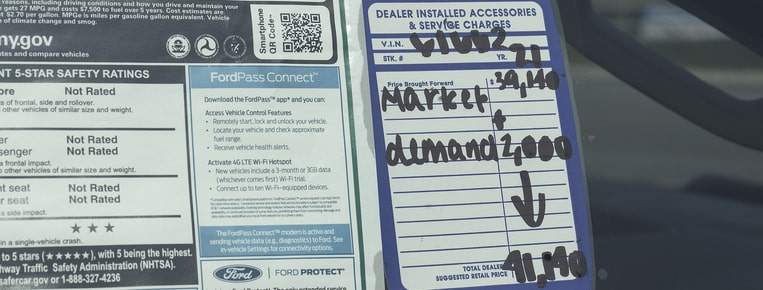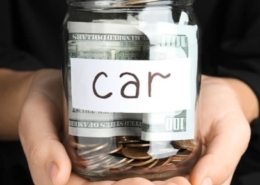Dealer Markup Secrets: Revealing the Truth Behind Car Pricing
Exposing dealer markup and market adjustment by empowering buyers to receive the best price.
Car shopping can be an exciting but overwhelming experience, especially when understanding the pricing structure. One aspect that often perplexes buyers is the dealer markup, which affects the final price of a vehicle.
In this article, we will delve into the secrets behind dealer markup, uncovering the truth and providing you with the knowledge to make informed decisions.
So, fasten your seatbelt, and let’s unveil the secrets!
Car Buying Tip: In the current market, it can be challenging to find an affordable car, as buyers often find themselves paying significantly above the MSRP. However, there’s no need to despair! By requesting free new car price quotes, you can compare prices from local dealers and seize the opportunity to secure an outstanding deal.
When visiting a dealership, you might have noticed that the price listed on a vehicle’s window sticker, commonly known as the Manufacturer’s Suggested Retail Price (MSRP), is often higher than expected.
This difference is attributed to the dealer markup. Understanding dealer markup is crucial as it directly impacts the final cost you pay for a car.
What is Dealer Markup?
Dealer markup refers to the additional amount that a dealer adds to the MSRP of a vehicle. It’s a way for dealerships to generate extra profit on the sale.
The markup can vary depending on several factors, and it’s essential to be aware of its presence during your car-buying journey.
Common reasons for dealer markup include the expenses of running a dealership, such as showroom costs, sales staff salaries, and advertising expenses.
Additionally, dealerships may try to take advantage of supply and demand dynamics, the popularity of certain vehicles, and local market conditions to maximize their profits.
Factors Influencing Dealer Markup
Several factors contribute to the decision of a dealership to impose an additional markup or market adjustment on a vehicle. These factors can include:
- Supply and Demand: Vehicles in high demand and limited supply will likely have an additional markup. The dealership uses the strong demand to increase the selling price and potentially enhance its profit margin.
- Exclusivity: Exclusive models or limited editions often come with a higher price tag due to their exclusivity and perceived increased value. Dealerships may add a markup to capitalize on the exclusivity factor and maximize their return.
- Brand Reputation: Dealerships selling vehicles from renowned and prestigious brands may apply additional markups, leveraging the reputation and desirability of the brand. Buyers often associate these brands with quality and are willing to pay a premium to own one.
- Market Conditions: Economic factors and regional market conditions can influence the decision to impose an additional markup. Dealerships located in areas with higher living costs or regions where demand outpaces supply are more likely to apply market adjustments.
- Dealer Strategy: Some dealerships adopt a pricing strategy that includes additional markups on specific vehicles to enhance profitability. It’s a tactic that aims to capitalize on the willingness of buyers to pay a premium for particular models or features
Strategies for Negotiating Dealer Markup
Navigating the world of dealer markup requires a strategic approach. Here are some effective strategies to help you negotiate a fair price:
- Researching the vehicle’s market value: Before visiting a dealership, thoroughly research the car you intend to purchase. Look for similar models and their prices in the local market. This information will provide a negotiation baseline and help you identify excessive markup.
- Awareness of dealer incentives and rebates: Dealerships often receive incentives and rebates from manufacturers. These incentives can be used to reduce the markup or provide additional savings to the buyer. Stay informed about the current incentives available for the vehicle you’re interested in, and use them as leverage during negotiations.
- Negotiating with multiple dealerships: Reach out to different dealerships and compare their offers. Creating competition among dealers increases your chances of obtaining a better deal. Be transparent about the quotes you’ve received from other dealerships, as this can motivate them to lower their markup.
- Considering alternative financing options: Financing through the dealership may incur additional fees and higher interest rates. Explore alternative auto financing options, such as pre-approved loans from banks or credit unions. With pre-approved financing, you can focus on negotiating the vehicle’s price rather than getting caught up in dealership financing tactics.
Understanding the Actual Cost of a Vehicle
To make informed decisions, it’s crucial to understand dealer price terms and the actual cost of a vehicle beyond the dealer markup. Here are some key factors to consider:
- Invoice price vs. MSRP: The invoice price is the amount the dealer pays the manufacturer for the vehicle. It’s generally lower than the MSRP. Understanding the invoice price gives you insight into the actual cost of the car to the dealer and provides a reference point for negotiations.
- Dealer holdback and factory-to-dealer incentives: Manufacturers often provide additional incentives to dealerships, such as holdbacks or factory-to-dealer incentives. These incentives serve as a form of reimbursement to the dealer and can help offset the markup. Inquire about these incentives and factor them into your negotiation strategy.
- Calculating the total cost of ownership: Beyond the purchase price, consider the long-term costs of owning a vehicle. This includes fuel efficiency, insurance rates, maintenance and repair expenses, and depreciation. By assessing the total cost of ownership, you can make a more informed decision about the vehicle’s overall value.
How to Avoid Overpaying For a New Car
To avoid overpaying for a vehicle, consider the following tips:
- Preparing for negotiations: Arm yourself with knowledge by researching the car, understanding its market value, and being aware of any incentives or rebates available. Know how much cash down you would like to put towards your purchase and calculate your fair profit new car offer. This preparation will give you confidence during negotiations and prevent you from being caught off guard.
- Being patient and willing to walk away: Don’t rush into a deal out of eagerness. Be patient and willing to walk away if the terms don’t align with your expectations. This mindset puts you in a stronger negotiating position and allows you to find a better deal elsewhere.
- Seeking pre-approved financing: Securing pre-approved financing from a bank or credit union gives you leverage during negotiations. It lets you focus on the vehicle price and terms rather than getting entangled in dealership financing options. This step is crucial if you have bumps in your credit history and require a bad credit auto loan.
- Considering certified pre-owned vehicles: If you’re open to the idea of a used vehicle, explore certified pre-owned options. These vehicles have undergone thorough inspections and have extended warranties, often cheaper than brand-new models. This can be a cost-effective alternative that helps you avoid excessive markup.
Online Car Shopping and Pricing Transparency
With the advent of the internet, online car shopping has become more transparent and accessible. Online platforms provide various benefits:
- Benefits of online car shopping: Online platforms allow you to explore various vehicles, compare prices, read customer reviews, and access detailed specifications. This saves time and enables you to make more informed decisions.
- Access to pricing information and comparisons: Online resources provide pricing information for specific makes and models, allowing you to compare prices from different dealerships. This empowers you to negotiate better deals by leveraging the available information.
- Online negotiation options: Some online platforms offer the ability to negotiate prices directly with dealerships, eliminating the need for in-person visits. This can be a convenient and efficient way to secure a competitive price while avoiding the pressure of face-to-face negotiations.
Frequently Asked Questions
What is the average dealer markup on new cars?
Dealer markups can vary depending on the vehicle’s popularity and market conditions. On average, dealer markups range from a few hundred dollars to a few thousand dollars.
Are dealer fees negotiable?
Yes, dealer fees are often negotiable. It’s worth discussing these fees with the dealership and seeking to reduce or eliminate unnecessary charges.
Can dealer markup be removed?
Dealer markup is part of the dealership’s profit margin but can be negotiated. By conducting research, being prepared, and negotiating with multiple dealerships, you can work towards reducing the markup or getting a better deal.
How can I determine if I’m overpaying for a vehicle?
To determine if you’re overpaying, research the vehicle’s market value, compare prices from different dealerships, and consider the actual cost of ownership. Additionally, seek pre-approved financing to have a clear understanding of your budget.
What are some alternative ways to purchase a car?
Besides traditional dealerships, alternative ways to purchase a car include private sellers, car auctions, and certified pre-owned programs. Each option has its advantages and considerations, so it’s essential to evaluate them based on your specific needs and preferences.
In Conclusion
Understanding the concept of additional dealer markup or market adjustment is crucial when navigating the car-buying process.
While it can be disheartening to encounter these additional charges, knowing the factors that influence them and how to negotiate effectively empowers you as a buyer.
Conduct thorough research, compare offers, and leverage your knowledge to secure the best deal possible.
Remember, negotiation is not limited to the additional markup itself. Exploring alternative models and dealerships or negotiating on other terms can also help you achieve a favorable outcome.
Stay informed, ask questions, and be prepared to walk away if the deal does not align with your expectations.
By unveiling the secrets behind additional dealer markup or market adjustment and employing effective negotiation strategies, you can make an informed decision and drive away with a reasonably priced vehicle.
I’ve got you covered if you need assistance during the car-buying process!
Feel free to take advantage of my free step-by-step guide on how to buy a new car. It’s designed to make your journey more accessible and more informed.
And if you’re short on time, no worries! Just fill out the form below to request free new car price quotes.
You’ll be able to research and compare prices from local dealerships hassle-free. It’s a convenient way to ensure you find the best deal in your area!
So, buckle up, explore your options, and enjoy the journey of finding the perfect car at the right price!

















